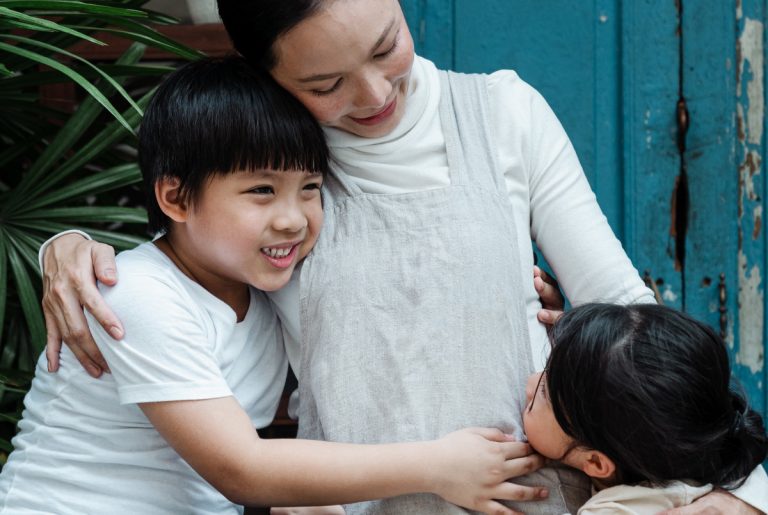Becoming a parent can be a joyful experience, but it’s not without its challenges. Depression and anxiety can rear their heads in the postpartum period, for both men and women – one in five women and one in 10 men will experience and postpartum depression or anxiety. Here, we share mental health advice for new parents to help you survive and find joy with a newborn.
Advice for new parents is endless, but nurturing your mental health is the key to surviving, and finding joy, in those sleep-deprived, weeks, months or years ahead. And remember – there’s always support available if you need it.
Prepare as much as you can
One of the many positives about having children is that you have nine months (technically 40 weeks) to prepare for their arrival.
Of course, getting the nursery ready, browsing tiny outfits and researching the latest gadgets is fun and exciting, but this is also the time to have those important conversations. Couples can enjoy discussions about names, parenting approaches, schooling, religion and contact with extended families. Each of these topics can raise new, unexpected or unresolved issues that are worth spending some time mulling over to avoid arguments when the baby arrives.
Build a support network
As many young families tell us (and as many of us here at Relationships Australia know ourselves) parenting can sometimes be very isolating in those initial weeks and months. As the excitement dies down and you settle into your new routine, you may find visits and offers for help also start to dry up.
But remember that you never have to do this alone. Finding new friends and communities to lean on for support and parenting advice can be so helpful at this time. There’s no unifier like early parenthood, so don’t be afraid to strike up conversations at the park. Facebook is another avenue for finding friends, groups and local community activities. Try and join some groups as a couple and some alone, to build up your confidence navigating the world with your new little family member.
Nurture important relationships
Before becoming a parent, you were an adult with interests, skills, likes and dislikes, and this doesn’t need to change after having a baby. Nurturing important relationships you had before becoming a parent is key to keeping your sense of self as you embark on your new life. One of these important relationships is the one you have with yourself. This might involve asking for help from others so you can have time for activities you enjoyed before becoming a parent.
Try to spend regular time with supportive people who understand your need to be flexible and can help you focus on other areas of your life as well as celebrating the milestones of your baby.
As hard as it is, try your best to prioritise sleep
It’s no secret that sleep is one of the biggest changes new parents face. Many will tell you to ‘sleep when baby sleeps’, but most new parents find that is the only time they have to themselves to relax, shower, do chores, or finally finish a hot beverage. One way this advice could be applied is going to bed early and rethinking what is crucial for you to get done each day.
Maintain your physical health
The first few months of parenting can be more challenging if your body is not getting enough nutrition, rest and activity. Try to eat a balanced diet or take supplements, especially if you are breastfeeding. Some physical activity will help keep your mind and body healthy. Going for short walks with your baby can break up the day, give you some fresh air, and grant you some much-need social time.
Stay intimate with your partner
Pregnancy, birth and tiny babies aren’t a winning combination when it comes to physical intimacy with your partner. Tiredness, hormonal changes, stress, the responsibility of being a parent, physical changes and pain can get in the way of being physically intimate.
As you are adjusting to the changes as a couple, keep your communication open and try to understand and respect each other’s needs, even though you may not be able to or want to respond to these needs immediately. Finding other ways to be intimate with your partner can help. Having a meal together, non-sexual touching, short dates, or small meaningful conversations regularly can help rebuild intimacy.
Assign clear roles in the household
It’s easy to make assumptions about who ‘should’ be doing what around the house. Who is going to be the main income earner? Who will do the chores? Who will take time off work if your child is sick? These may seem like easy questions to answer, but having the conversation, committing to ongoing communication, and being open to change in the future, can help to prevent conflict. There is no right answer on the division of labour, but the happiest households usually work as a team.
Be kind to yourself and watch for warning signs
Birth is a major medical event, even if commonplace. Be prepared for physical issues to remain for a while and try and rest and recuperate as much as your new addition will allow. If in the first weeks or months of bringing your newborn home you’re feeling overwhelmed, just know that these feelings are completely normal. Not only are you going through an enormous life transition, but you are contending with sleep deprivation and a gigantic hormonal shift (or perhaps supporting your partner through one). Maintain open, clear communication with your partner about your feelings and ask them to do the same.
If you reach a point where you feel you may need more support, reach out for help, especially if you have fears surrounding developing post-natal depression or anxiety. Be aware that there are a lot of resources still available to help parents at home and talking to your GP is a good place to start. Some of the signs that you may have PND include lack of confidence, feeing unable to cope and negative thoughts.
Relationships Australia NSW can support you through individual or couples counselling. We also offer a number of evidence-based Group Workshops which are a convenient way to access expert advice, and strengthen your skills in everything from parenting and building strong relationships with your kids, to effectively communicating with your partner.
Related Services & Workshops

Group Workshops.Families.Parenting
Tuning in to Kids
This program helps parents and carers of children 12 and under ‘tune in’ and improve communication and connection with their kids. Practical tools help you build emotional intelligence in your child and manage challenging behaviour.

Tailored Services.Individuals.Mental Health.Multicultural
Community Builders
Community Builders delivers free programs to community, multicultural and faith groups and local schools throughout Northern Sydney, to help build resilience, connection and growth.






